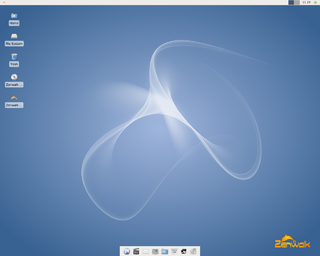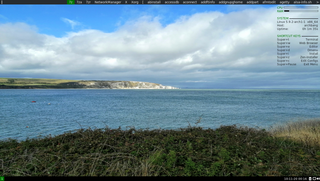
A Linux distribution is an operating system made from a software collection that is based upon the Linux kernel and, often, a package management system. Linux users usually obtain their operating system by downloading one of the Linux distributions, which are available for a wide variety of systems ranging from embedded devices and personal computers to powerful supercomputers.

A live CD is a complete bootable computer installation including operating system which runs directly from a CD-ROM or similar storage device into a computer's memory, rather than loading from a hard disk drive. A live CD allows users to run an operating system for any purpose without installing it or making any changes to the computer's configuration. Live CDs can run on a computer without secondary storage, such as a hard disk drive, or with a corrupted hard disk drive or file system, allowing data recovery.

Damn Small Linux (DSL) is a computer operating system for the x86 family of personal computers. It is free and open-source software under the terms of the GNU GPL and other free and open source licenses. It was designed to run graphical user interface applications on older PC hardware, for example, machines with 486 and early Pentium microprocessors and very little random-access memory (RAM). DSL is a Live CD with a size of 50 megabytes (MB). What originally began as an experiment to see how much software could fit in 50 MB eventually became a full Linux distribution. It can be installed on storage media with small capacities, like bootable business cards, USB flash drives, various memory cards, and Zip drives.

CUPS is a modular printing system for Unix-like computer operating systems which allows a computer to act as a print server. A computer running CUPS is a host that can accept print jobs from client computers, process them, and send them to the appropriate printer.

PCLinuxOS, often shortened to PCLOS, is an x86-64 Linux distribution, with KDE Plasma Desktop, MATE and XFCE as its default user interfaces. It is a primarily free software operating system for personal computers aimed at ease of use. It is considered a rolling release.

ALT Linux is a set of Russian operating systems based on RPM Package Manager (RPM) and built on a Linux kernel and Sisyphus package repository. ALT Linux has been developed collectively by ALT Linux Team developers community and ALT Linux Ltd.

Puppy Linux is an operating system and family of light-weight Linux distributions that focus on ease of use and minimal memory footprint. The entire system can be run from random-access memory with current versions generally taking up about 600 MB (64-bit), 300 MB (32-bit), allowing the boot medium to be removed after the operating system has started. Applications such as AbiWord, Gnumeric and MPlayer are included, along with a choice of lightweight web browsers and a utility for downloading other packages. The distribution was originally developed by Barry Kauler and other members of the community, until Kauler retired in 2013. The tool Woof can build a Puppy Linux distribution from the binary packages of other Linux distributions.

Zenwalk is a Desktop focused Linux distribution founded by Jean-Philippe Guillemin. It is based on Slackware with very few modifications at system level making it 100% compatible with it. Zenwalk aims to be a modern and multi-purpose Linux distribution by focusing on Internet applications, multimedia and programming tools. Additionally, Zenwalk comes with many specialized tools, designed for beginner through advanced users as it offers system configuration via both graphical and command-line operations.

A live USB is a USB flash drive or external hard disk drive containing a full operating system that can be booted. They are the evolutionary next step after live CDs, but with the added benefit of writable storage, allowing customizations to the booted operating system. Live USBs can be used in embedded systems for system administration, data recovery, or test driving, and can persistently save settings and install software packages on the USB device.

puredyne is a discontinued live Linux distribution based on Ubuntu and Debian Live and dedicated to live audio-and-visual processing and streaming. Its focus was on the Pure Data audio synthesis system as well as SuperCollider, Csound and others, plus live video-processing systems such as Processing and Fluxus. It also included hardware related software such as arduino and came bundled with home-studio and graphic design software.

Software remastering is software development that recreates system software and applications while incorporating customizations, with the intent that it is copied and run elsewhere for "off-label" usage. The term comes from remastering in media production, where it is similarly distinguished from mere copying.

Ubuntu Studio is a recognized flavor of the Ubuntu Linux distribution, which is geared to general multimedia production. The original version, based on Ubuntu 7.04, was released on 10 May 2007.

remastersys is a free and open-source program for Debian, Ubuntu-based, Linux Mint or derivative software systems that can:

Clonezilla is a free and open-source disk cloning, disk imaging, data recovery, and deployment computer program. Clonezilla is designed by Steven Shiau and developed by the NCHC Free Software Labs in Taiwan. Clonezilla SE provides multicast support similar to Norton Ghost Corporate Edition.

Ubiquity is the default installer for Ubuntu and its derivatives. It is run from the Live CD or USB and can be triggered to run from the options on the device or on the desktop of the Live mode. It was first introduced in Ubuntu 6.06 LTS "Dapper Drake". At program start, it allows the user to change the language to a local language if they prefer. It is designed to be easy to use.

Granular, or Granular Linux, is a Linux distribution targeted at the common desktop users. Granular is based on PCLinuxOS and comes as an installable live CD. The CD version of Granular features two desktop environments - KDE and a development version of Enlightenment. Where KDE is a full-featured desktop environment, Enlightenment is a lightweight desktop shell which is markedly faster than KDE.
Vinux is a Linux distribution which has been specially designed for blind and partially sighted users. Specifically it is a remastered version of the Ubuntu distribution and provides users with two screen readers, two full-screen magnifiers, global font-size and colour changing facilities. The system also supports USB Braille displays.

ArchBang Linux is a simple lightweight rolling release Linux distribution based on a minimal Arch Linux operating system with the i3 window manager, but was previously using the Openbox windows manager. ArchBang is especially suitable for high performance on old or low-end hardware with limited resources. ArchBang's aim is to provide a simple out-of-the-box Arch-based Linux distribution with a pre-configured Openbox desktop suite, adhering to Arch principles.